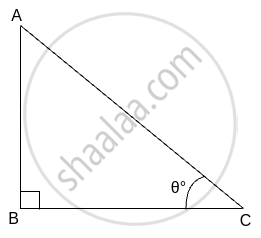Advertisements
Advertisements
प्रश्न
Prove the following identities, where the angles involved are acute angles for which the expressions are defined:
`(1+ secA)/sec A = (sin^2A)/(1-cosA)`
[Hint : Simplify LHS and RHS separately.]
उत्तर
L.H.S
`(1+secA)/secA = (1+1/(cosA))/(1/cosA)`
= `((cosA+1)/cosA)/(1/cosA)`
= `(cosA+1)`
= `((1-cosA)(1+cosA))/(1-cosA)`
= `(1-cos^2A)/(1-cosA)`
= `(sin^2A)/(1-cosA)` ...[∵ 1cos2 A = sin2A]
R.H.S
APPEARS IN
संबंधित प्रश्न
Prove that `\frac{\sin \theta -\cos \theta }{\sin \theta +\cos \theta }+\frac{\sin\theta +\cos \theta }{\sin \theta -\cos \theta }=\frac{2}{2\sin^{2}\theta -1}`
Prove the following trigonometric identities.
`cosec theta sqrt(1 - cos^2 theta) = 1`
Prove the following trigonometric identities
`cos theta/(1 - sin theta) = (1 + sin theta)/cos theta`
Prove the following trigonometric identities.
`sqrt((1 - cos theta)/(1 + cos theta)) = cosec theta - cot theta`
Prove the following trigonometric identities.
`tan^2 theta - sin^2 theta tan^2 theta sin^2 theta`
Prove the following trigonometric identities.
`cot theta - tan theta = (2 cos^2 theta - 1)/(sin theta cos theta)`
Prove the following identities:
`1/(tan A + cot A) = cos A sin A`
If `cosA/cosB = m` and `cosA/sinB = n`, show that : (m2 + n2) cos2 B = n2.
Show that : tan 10° tan 15° tan 75° tan 80° = 1
Show that : `sinA/sin(90^circ - A) + cosA/cos(90^circ - A) = sec A cosec A`
Prove the following identities:
`sinA/(1 - cosA) - cotA = cosecA`
(i)` (1-cos^2 theta )cosec^2theta = 1`
`(1 + cot^2 theta ) sin^2 theta =1`
`sqrt((1+sin theta)/(1-sin theta)) = (sec theta + tan theta)`
`(cos ec^theta + cot theta )/( cos ec theta - cot theta ) = (cosec theta + cot theta )^2 = 1+2 cot^2 theta + 2cosec theta cot theta`
`(sin theta)/((sec theta + tan theta -1)) + cos theta/((cosec theta + cot theta -1))=1`
If `( cosec theta + cot theta ) =m and ( cosec theta - cot theta ) = n, ` show that mn = 1.
If x=a `cos^3 theta and y = b sin ^3 theta ," prove that " (x/a)^(2/3) + ( y/b)^(2/3) = 1.`
Write the value of tan1° tan 2° ........ tan 89° .
Write True' or False' and justify your answer the following :
The value of \[\sin \theta\] is \[x + \frac{1}{x}\] where 'x' is a positive real number .
Write True' or False' and justify your answer the following:
\[ \cos \theta = \frac{a^2 + b^2}{2ab}\]where a and b are two distinct numbers such that ab > 0.
Prove that:
(cosec θ - sinθ )(secθ - cosθ ) ( tanθ +cot θ) =1
Prove the following identity :
`sec^2A.cosec^2A = tan^2A + cot^2A + 2`
Prove the following Identities :
`(cosecA)/(cotA+tanA)=cosA`
If x = acosθ , y = bcotθ , prove that `a^2/x^2 - b^2/y^2 = 1.`
If x = asecθ + btanθ and y = atanθ + bsecθ , prove that `x^2 - y^2 = a^2 - b^2`
Without using trigonometric identity , show that :
`tan10^circ tan20^circ tan30^circ tan70^circ tan80^circ = 1/sqrt(3)`
Without using trigonometric identity , show that :
`sec70^circ sin20^circ - cos20^circ cosec70^circ = 0`
Prove that:
tan (55° + x) = cot (35° – x)
Prove that `sqrt((1 + sin A)/(1 - sin A))` = sec A + tan A.
Prove that `(sin (90° - θ))/cos θ + (tan (90° - θ))/cot θ + (cosec (90° - θ))/sec θ = 3`.
Prove that `(sin θ. cos (90° - θ) cos θ)/sin( 90° - θ) + (cos θ sin (90° - θ) sin θ)/(cos(90° - θ)) = 1`.
If cos (α + β) = 0, then sin (α – β) can be reduced to ______.
Prove the following:
`tanA/(1 + sec A) - tanA/(1 - sec A)` = 2cosec A
(tan θ + 2)(2 tan θ + 1) = 5 tan θ + sec2θ.
If 2sin2θ – cos2θ = 2, then find the value of θ.
Eliminate θ if x = r cosθ and y = r sinθ.
Find the value of sin2θ + cos2θ

Solution:
In Δ ABC, ∠ABC = 90°, ∠C = θ°
AB2 + BC2 = `square` .....(Pythagoras theorem)
Divide both sides by AC2
`"AB"^2/"AC"^2 + "BC"^2/"AC"^2 = "AC"^2/"AC"^2`
∴ `("AB"^2/"AC"^2) + ("BC"^2/"AC"^2) = 1`
But `"AB"/"AC" = square and "BC"/"AC" = square`
∴ `sin^2 theta + cos^2 theta = square`
